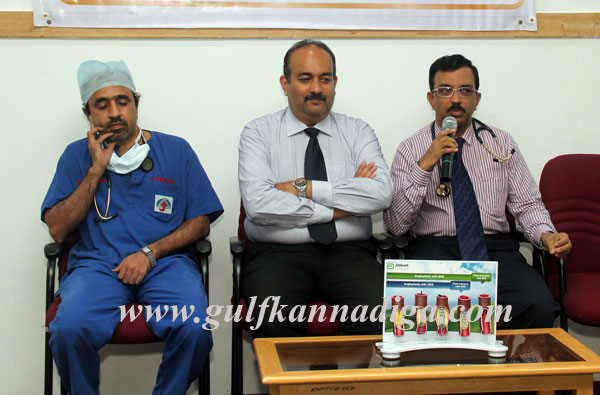Mangalore, Oct. 23: Innovative treatment for blocked arteries now available at A.J Hospital here.
“Treatments for coronary artery disease have come a long way from the days of balloon angioplasties and metal stents. However, a dissolving stent like BVS is interesting as the clogged artery can be enlarged and supported effectively without the stent leaving any fragments behind in the blood stream, explains Dr. B.V.Manjunath, Chief Interventional Cardiologist and Professor and Head of Cardiology, A. J. Hospital and Research Centre and Medical College.
BVS is a groundbreaking device designed to restore blood flow by opening a clogged vessel and providing support while it heals. Once the vessel can remain open without the extra support, the bioresorbable scaffold is designed to be slowly metabolized and eventually dissolves into carbon dioxide and water in the body.
For the first time in India, insurance is provided to the patient with BVS by the manufacturers of BVS (M/s. Abbott Vascular, USA). Insurance covers against the risk of re-do procedure: Percutaneous Transluminal Coronary Angioplasty (PTCA), Coronary Artery Bypass Graft (CABG) and Plain Old Balloon Angioplasty (POBA) in a patient where BVS is deployed. The sum assured per scaffold is INR 2 lakh which will cover hospitalization expenses. The cover is valid for 2 years from the date of implant.
Interventional Cardiologist & Associate Professor, A.J. Hospital and Research Centre and Medical College, Dr. R. Purushotham added “The device is made of polylactide, a proven biocompatible material that is commonly used in medical implants such as dissolving sutures. Since a permanent implant is not left behind, a vessel treated with a BVS ultimately may have the ability to move, flex and pulsate similar to an untreated vessel. The potential to restore these naturally occurring vessel functions, or vascular restoration, is one of the features that will make BVS unique in the treatment of coronary artery disease.”
Cardiovascular disease remains the leading cause of death globally and By 2030, almost 23.6 million people will die from cardiovascular disease every year. The largest increase in number of deaths will occur in the South- East Asia Region.
The average age of people with heart ailments is coming down. With an ever-increasing number of young Indians suffering from heart diseases, a drastic change in lifestyle and eating habits is the need of the hour to tackle the alarming situation. On top of it, indulgence in smoking and drinking to “reduce the stress” worsens the situation. Such a lifestyle results in high blood pressure, obesity, diabetes, etc. leading to heart ailments.



